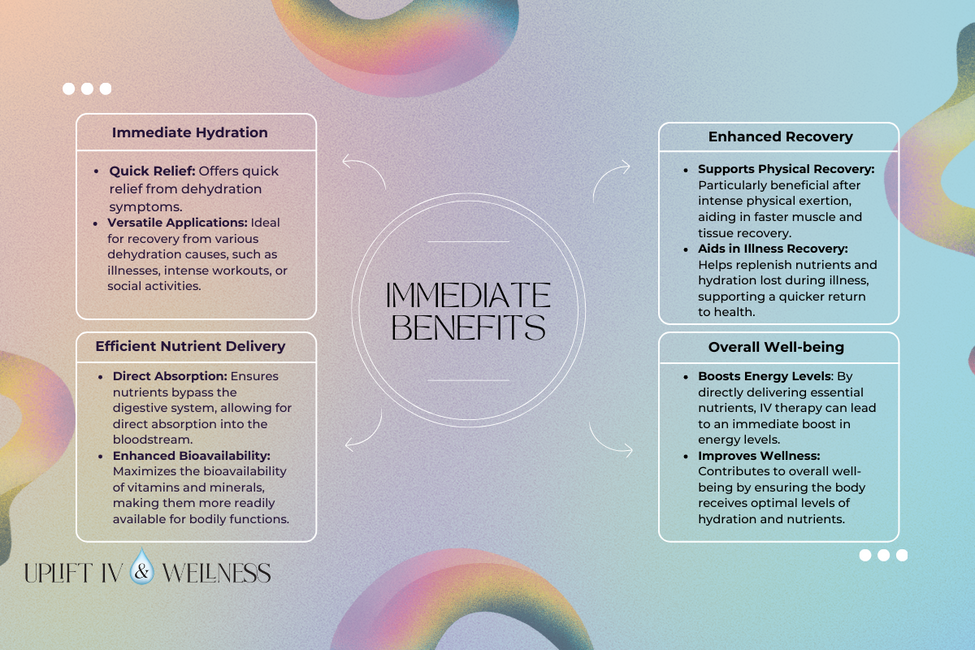
How Long Does IV Therapy Last in Your Body?
March 20, 2024
Intravenous (IV) therapy, a method that administers fluids and nutrients directly into the bloodstream, has seen a significant rise in popularity across health and wellness communities. This surge is attributable to its efficacy in delivering essential elements directly into the bloodstream, ensuring rapid absorption and immediate benefits. As more individuals turn to IV therapy for its health-enhancing properties, a common question arises: How long does IV therapy last in your body? This blog post aims to shed light on the duration of IV therapy effects within the body, providing readers with valuable insights into how they can leverage this treatment for optimal health benefits.
Understanding IV Therapy
Definition of IV Therapy and Its Purposes
IV therapy is a medical technique that involves the delivery of nutrients, medications, or hydration directly into a person’s bloodstream through a vein. This method bypasses the digestive system, allowing for immediate absorption and utilization by the body. The primary purpose of IV therapy is to improve overall health, address specific nutrient deficiencies, or support recovery from illness. It’s particularly beneficial for individuals seeking rapid results, such as athletes, patients recovering from surgery, or those with certain health conditions that impair nutrient absorption.
Types of IV Therapies and Their Common Uses

There are several types of IV therapies, each tailored to meet different health needs:
- Hydration Therapy: Designed to quickly replenish body fluids, commonly used to treat dehydration resulting from illness, exercise, or excessive alcohol intake.
- Vitamin Infusions: These infusions supply essential vitamins and minerals directly into the bloodstream, popular for enhancing energy, boosting the immune system, and improving skin health.
- Medication Delivery: IV therapy can also be used to administer medications directly into the bloodstream for immediate effect, often used in hospitals for pain relief, and antibiotics.
The Process of IV Therapy: How It Is Administered
The administration of IV therapy is a straightforward process performed by a healthcare professional. It begins with the insertion of a small, thin needle into a vein, typically in the arm. The needle is attached to a tube, which is connected to a bag containing the IV solution. The solution then drips through the tube and into the bloodstream over a period, which can range from 20 minutes to over an hour, depending on the type of therapy being administered.
By understanding the fundamental aspects of IV therapy, including its definition, types, and administration process, individuals can better appreciate the value it brings to health and wellness. Moreover, grasping these basics sets the stage for exploring the critical question: How long does IV therapy last in your body?
Benefits of IV Therapy
IV therapy has garnered significant attention in the health and wellness industry for its ability to deliver nutrients and medications directly into the bloodstream, offering rapid and effective results. Understanding the immediate and long-term benefits of this treatment can provide insight into why individuals are increasingly turning to IV therapy.
Immediate Benefits of IV Therapy

The transformative benefits of IV therapy: hydration and energy boost.
One of the most notable immediate benefits of IV therapy is rapid hydration. This is crucial for individuals suffering from dehydration due to various factors, including illness, intense physical activity, or even a night out. Besides hydration, IV therapy is renowned for its ability to facilitate direct vitamin absorption. Unlike oral supplements, which must undergo digestion, IV therapy ensures that vitamins and minerals are immediately available to your body, enhancing efficiency and effectiveness.
Long-Term Benefits of IV Therapy
Beyond immediate relief and replenishment, IV therapy offers several long-term benefits. It supports the immune system, thanks to the direct infusion of vitamins and minerals that are essential for maintaining health and fighting off illnesses. Additionally, many recipients of IV therapy report enhanced energy levels over time, attributed to the optimal nutrient balance achieved through personalized treatment plans.
Optimizing Cellular Health and Preventing Chronic Conditions with IV Therapy
IV therapy enhances cellular health, ensuring all bodily functions operate optimally, leading to improved overall well-being and vitality. By working at the cellular level, IV therapy also supports long-term health, potentially preventing chronic conditions such as heart disease, cancer, and dementia through the infusion of vital nutrients and complementing a healthy lifestyle with diet and exercise.
Factors Influencing the Duration of IV Therapy in the Body
While IV therapy offers numerous benefits, many wonder, How long does IV therapy last in your body? The answer varies, influenced by several factors including individual health profiles and lifestyle choices.
Individual Health and Metabolic Rate
Your body’s unique characteristics, such as metabolic rate and overall health, play a significant role in determining how long the effects of IV therapy will last. Individuals with faster metabolisms may process nutrients more quickly, potentially shortening the duration of benefits.
Type of IV Therapy Received
The specific IV therapy you receive—whether it’s hydration, vitamin infusions, or medication delivery—also affects longevity. Nutrient infusions might have a different impact on your body compared to direct medication delivery, influencing how long the effects are felt.
Lifestyle Factors
Lifestyle choices, including diet, hydration levels, and exercise, can either extend or reduce the lasting impact of IV therapy. A well-balanced diet and regular hydration support the sustained benefits of the therapy, while neglecting these aspects can shorten its efficacy.
Body’s Absorption Rate and Distribution System
Finally, the body’s natural absorption rate and how it distributes the infused substances are crucial. Even with direct bloodstream delivery, individual differences in how substances are absorbed and utilized can affect the duration of IV therapy’s benefits.
Understanding these factors can help individuals tailor their IV therapy experiences and manage expectations regarding the duration of benefits. Optimizing these aspects may not only prolong the effects but also enhance overall health and well-being.
How Long Does IV Therapy Typically Last?
A common question among those considering or currently receiving IV therapy is, How long does IV therapy last in your body? The duration of IV therapy’s effects can vary widely based on the type of therapy and individual health factors. This section aims to provide a general understanding of how long you can expect the benefits of IV therapy to last and how frequently treatments might be needed for ongoing benefits.
General Timeframe for Different Types of IV Therapies
- Hydration IV Therapy: Typically, the effects of hydration IV therapy can be felt immediately and may last for 24 to 48 hours, depending on your level of dehydration and activity.
- Vitamin Infusion Therapy: The benefits of vitamin infusion therapies, such as increased energy and immune support, can last from a few days to two weeks.
- Medication Delivery IV Therapy: The duration of medication delivery via IV can vary greatly depending on the medication’s purpose. Pain relief may be immediate, depending on the medication it may take 30 minutes and last up to three hours or days, while antibiotic treatments might have effects that last as long as the treatment course is continued.
How Often Should One Receive IV Therapy for Sustained Benefits?
The frequency of IV therapy sessions depends on your goals, the specific therapy, and individual health needs. Some may benefit from bi-weekly sessions (common for nutrient infusions), while others may find monthly sessions sufficient for maintaining their desired level of wellness.
The Importance of Consulting with Healthcare Professionals
Given the variability in how long IV therapy lasts in the body, it’s crucial to consult with healthcare professionals. They can provide personalized advice based on your health history, current condition, and wellness goals, ensuring that IV therapy is both safe and effective for you.
Maximizing the Benefits of IV Therapy
To extend the effectiveness of IV therapy and enhance overall well-being, consider the following strategies:
Tips for Maintaining the Effects of IV Therapy
- Stay Hydrated: Drinking plenty of water can help sustain the hydration benefits of IV therapy.
- Maintain a Balanced Diet: A diet rich in vitamins and minerals supports the body in maintaining the levels achieved through IV therapy.
- Adopt Healthy Lifestyle Habits: Regular exercise, adequate sleep, and stress management can prolong the benefits of IV therapy.
Potential Side Effects or Considerations
While IV therapy is generally safe, being aware of potential side effects is important. These can include bruising at the injection site, feeling of warmth during the infusion, or, rarely, allergic reactions. Always discuss potential risks with your healthcare provider.
The Importance of Follow-up Sessions and Regular Evaluations

To ensure that IV therapy continues to meet your health needs and goals, regular follow-up sessions and evaluations with a healthcare provider are essential. These appointments provide an opportunity to adjust your treatment plan as needed and address any concerns that may arise.
By understanding the typical duration of IV therapy’s effects and adopting strategies to maximize its benefits, individuals can make informed decisions about their health and wellness journeys. Remember, personalized advice from healthcare professionals is invaluable in navigating the world of IV therapy for optimal results. Experience the transformative power of IV therapy today—book your session at Uplift IV Wellness and elevate your health to new heights!
FAQs About IV Therapy
In this section, we address some frequently asked questions about IV therapy, focusing on its safety, efficacy, and suitability for different individuals.
Is IV Therapy Safe?
IV therapy is generally considered safe when administered by trained and certified healthcare professionals. They ensure the process is conducted under sterile conditions to prevent infections and monitor for any adverse reactions.
How Effective is IV Therapy?
The effectiveness of IV therapy depends on the individual’s health status and the specific therapy provided. Since nutrients and medications are delivered directly into the bloodstream, bypassing the digestive system, absorption is typically higher and faster compared to oral supplements, leading to quicker and more pronounced benefits.
Who Can Benefit from IV Therapy?
IV therapy can benefit a wide range of individuals, from those looking to boost their overall wellness to patients recovering from illnesses or those with specific nutritional deficiencies. However, it’s essential to consult with a healthcare professional to determine if IV therapy is appropriate for your specific health needs.
How Long Does IV Therapy Last in Your Body?
The duration of IV therapy’s effects can vary significantly based on the type of therapy, individual health factors, and lifestyle choices. While some benefits, like hydration, can be felt almost immediately and may last for a day or two, other benefits, such as improved vitamin levels, can have longer-lasting impacts for weeks. Regular sessions may be recommended to maintain these benefits, but the frequency should be personalized based on professional advice.
Throughout this post, we’ve explored the intricacies of IV therapy, particularly focusing on the duration of its effects in the body. It’s clear that IV therapy offers a range of benefits, from immediate hydration and nutrient absorption to long-term health improvements. However, the lasting impact varies widely among individuals, influenced by several factors including the type of therapy, individual health, and lifestyle habits.
If you’re considering IV therapy as a part of your health and wellness routine, it’s crucial to consult with a healthcare provider. They can offer personalized advice based on your health history and goals, ensuring that you receive the most appropriate and effective treatment.